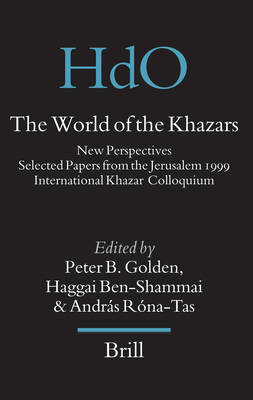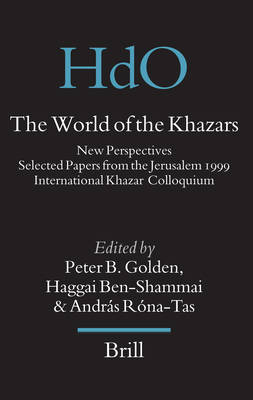
- Afhalen na 1 uur in een winkel met voorraad
- Gratis thuislevering in België vanaf € 30
- Ruim aanbod met 7 miljoen producten
- Afhalen na 1 uur in een winkel met voorraad
- Gratis thuislevering in België vanaf € 30
- Ruim aanbod met 7 miljoen producten
Zoeken
The World of the Khazars
New Perspectives. Selected Papers from the Jerusalem 1999 International Khazar Colloquium
€ 314,45
+ 628 punten
Omschrijving
This volume, a product of international collaboration, presents readers with the state of the field in Khazar Studies.
The Khazar Empire (ca. 650 - ca. 965-969), one of the largest states of medieval Eurasia, extended from the Middle Volga lands in the north to the Northern Caucasus and Crimea in the south and from the Ukrainians steppelands to the western borders of Kazakhstan and Uzbekistan in the east. Turkic in origin, it played a key role in the history of the peoples of Rus', medieval Hungary and the Caucasus. Khazaria became one of the great trans-Eurasian trading terminals connecting the northern forest zones with Byzantium and the Arabian Caliphate. In the ninth century, the Khazars converted to Judaism. This book sheds new light on many unanswered, but fundamental questions regarding the Khazar Empire, so important in medieval Eurasia.
The Khazar Empire (ca. 650 - ca. 965-969), one of the largest states of medieval Eurasia, extended from the Middle Volga lands in the north to the Northern Caucasus and Crimea in the south and from the Ukrainians steppelands to the western borders of Kazakhstan and Uzbekistan in the east. Turkic in origin, it played a key role in the history of the peoples of Rus', medieval Hungary and the Caucasus. Khazaria became one of the great trans-Eurasian trading terminals connecting the northern forest zones with Byzantium and the Arabian Caliphate. In the ninth century, the Khazars converted to Judaism. This book sheds new light on many unanswered, but fundamental questions regarding the Khazar Empire, so important in medieval Eurasia.
Specificaties
Betrokkenen
- Uitgeverij:
Inhoud
- Aantal bladzijden:
- 468
- Taal:
- Engels
- Reeks:
- Reeksnummer:
- nr. 17
Eigenschappen
- Productcode (EAN):
- 9789004160422
- Verschijningsdatum:
- 13/08/2007
- Uitvoering:
- Hardcover
- Formaat:
- Genaaid
- Afmetingen:
- 169 mm x 245 mm
- Gewicht:
- 997 g

Alleen bij Standaard Boekhandel
+ 628 punten op je klantenkaart van Standaard Boekhandel
Beoordelingen
We publiceren alleen reviews die voldoen aan de voorwaarden voor reviews. Bekijk onze voorwaarden voor reviews.







